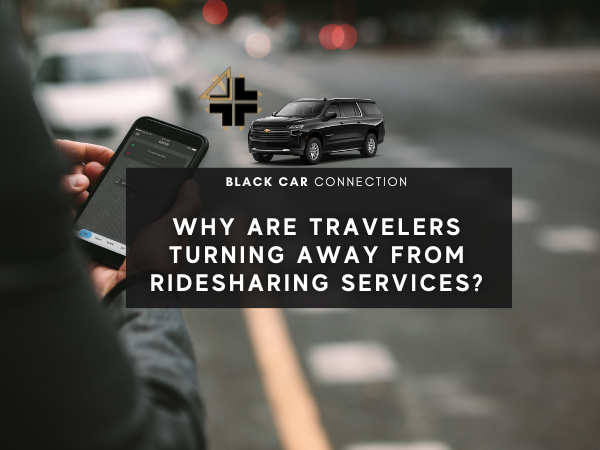Why Travelers Are Turning Away from Ridesharing Services
Ridesharing services have become increasingly popular over the years as an alternative to taxi cabs and public transportation.
But despite all the benefits of ridesharing, many travelers are turning away from these services, especially in more touristy areas of the world, because of several glaring facts: safety, expenses, and lack of flexibility.
Ridesharing isn’t as popular among travelers as it used to be.
In fact, over the past few years, the number of rideshare drivers has decreased by about 40%.
Due to this, many rideshare companies still struggle to run their business to the fullest.
Also, according to the statistics, global ridesharing has experienced a massive decline in demand for ridesharing.
So let us discuss the disadvantages of ridesharing due to which travelers are avoiding ridesharing!
Increasing Rate of Auto Accidents:
As rideshare services like Uber and Lyft have become more popular, so has the number of accidents.
These accidents are often caused by drivers who are driving for a living and are not properly trained to do so. Their lack of experience can cause major accidents that can end in injury or death.
The ever-increasing rate of accidents in ridesharing vehicles might be the reason for turning the traveler’s offer. According to several reports, the introduction of ridesharing is responsible for a 3% annual increase in fatal accidents in the U.S. since 2010, leading to 987 additional deaths yearly.
Ridesharing drivers involved in accidents injure their passengers and passengers in other vehicles or pedestrians in the street. The key reason cited behind the accidents is fatigue.
Due to the late or long hours, drivers experienced extreme tiredness that impacts their reaction times and situational awareness.
On top of that, ridesharing drivers are likely to be in a hurry to get more business. Cell phones or even ridesharing apps can lead to fatal distractions for drivers.
No wonder why travelers are giving fewer preferences to ridesharing services.
Getting a Legal Claim for Accident is Difficult:
Getting Uber and Lyft accident claims are not easy.
In fact, they can be more stressful and challenging than other auto accident claims. Sure, rideshare companies have commercial insurance in place to protect their drivers on duty.
But they have their “terms and conditions” and other loopholes in place to shift the blame. For example, the drivers are not their regular employees but independent contractors. And this makes the process of claiming accident insurance more complicated.
These companies must only insure their drivers and passengers for a certain period. If any mishap occurs outside these periods, the rideshare companies are not liable to pay for the damages and injuries.
When you book your ride with them, you are supposed to accept their terms and conditions.
If an accident occurs, you may be held responsible for paying damages unless you sue the driver and/or the ridesharing company, depending on your insurance policy and selected service.
You need to make sure that your rideshare driver has accident insurance. But this is the tip of the iceberg of how complicated it is to get the claim from a rideshare company.
Safety Issues:
Ridesharing services also have their fair share of security issues, making people think twice while booking them. Thanks to the number of incidents associated with ridesharing vehicles.
Therefore, keeping passengers safe can sometimes be challenging as they are not aware of the criminal record of their ridesharing driver.
Passengers are likely to feel less safe in a car with someone they don’t know. As well, passengers may not be as friendly and personal to their drivers as they were to their old taxi drivers.
Many people say that driving a vehicle with someone they do not know is just too risky.
According to one report, over 3,000 sexual assaults were reported in 2021 for one major ridesharing company.
The ever-increasing crime rate can be owed to poor driver screening.
While taxi drivers must undergo strenuous fingerprint checks through the FBI database, ride-hailing drivers are only subject to a few background checks.
In 2016, the lawsuit filed by the cities of LA and San Francisco revealed that over 20 drivers had serious criminal charges, including murder and assault.
In its 2019 report, Uber revealed that ten murders happened in 2017 and nine in 2018, while there were over 2900 sexual assaults, including nonconsensual touching and rape.
One victim wrote in an open letter representing the victims of sexual harassment and rape by ridesharing drivers—
“Although I immediately reported what happened to Uber, shockingly, this predator continues to drive for Uber to this day. I am 21 years old and will have to live with this the rest of my life.”
It is not scribbled on your face whether a person who arrived to pick you up is genuine or a criminal.
The increasing crime rates while carpooling makes the passenger anxious throughout the journey until they reach their destination, especially when the rider is not fixed.
Therefore, somehow it also affects the peace of mind of the passenger. It remains suspicious and closely notices the activities and behavior of the driver.
Not Regulated:
Taxis are bound by the laws and regulations of the area where they operate. But this is not the case with ridesharing services, as these regulations don’t apply to them in most cases.
The good thing is that many states have started imposing laws and liability guidelines for ridesharing services.
No Personal Training:
Given that rideshare drivers are categorized as independent contractors, rideshare companies might argue that they are not responsible for any negligent actions taken by the drivers.
Top of that, most of these drivers are not professional as they use their vehicles and lack a commercial driver’s license as well. No wonder they might lack a good driving history.
The level of security ensured by a professional driver in dangerous driving situations or weather turbulences is not provided by a ridesharing driver as they lack professional training and certification.
It Costs a Lot More:
The ever-increasing price of ridesharing companies is one of the reasons that travelers prefer cheaper options like taxis.
According to one report, the cost of booking a ride from ridesharing apps like Lyft or Uber has gone 92% between January 2018 and July 2021, as well as a much longer wait time.
Additionally, the cost of an Uber journey is based on the pace of the trip in certain cities. When moving, regular taxis bill their customers by a mile; when stationary, they bill per minute.
Whether a rider is moving, Uber charges per mile and minute. Since Uber charges for both the miles driven and the amount of driving time, its prices decrease as the speed increases. As a result, taxis can become more appealing during traffic.
If you think ridesharing will get cheaper the more, you need to think again.
For example, companies like Uber seem to have the opposite of what a reward program ensures.
Paradoxically, the more you ride with them, the more they will increase their charges per mile. It means that they can charge their customers whatever they want, thanks to the norms of upfront pricing.
The surge pricing model is another key factor that can increase the cost. For example, Uber uses this model that varies based on demand, so one must pay higher fares on nights when cabs are in high demand, such as Christmas.
Apart from that, they have a cancellation fee that varies by area.
This surge in price by ridesharing companies majorly affects the daily or frequent travelers who need to plan their budget according to travel costs.
Lack of Flexibility for Spontaneous Travel:
Ridesharing services like Uber and Lyft have been popular among travelers because they provide a convenient way to get around without needing to rent a car or take public transit.
However, the lack of flexibility for spontaneous travel has made it clear that these rideshare apps are not the best option for everyone.
The service often requires you to book in advance before traveling, which can be frustrating if your plans change last minute.
Even though you may be charged a cancellation fee for canceling with less than 24 hours’ notice, the fee is typically cheaper than what you would pay if you rented a car or took public transit. If you want an easy ride at all times, renting a car might be your better option.
Facing Technical Glitches:
Most renowned and reputable ridesharing companies operate based on GPS applications. Due to the unavailability of a stable network, the current location of the driver coming to pick you up may not be updated, which can further make you anxious.
The passenger often complains that their ride automatically gets canceled by the driver or any technical issue in the app.
It enables them to reach their destination on time. Such issues become more challenging for them to reach their job location or exam center on time.
In Conclusion:
All the factors discussed above reflect why travelers are neglecting ridesharing to a certain extent. It mainly involves competitive pricing, non-reliability, the surge in crime rates, and, most importantly, security concerns.
Try Black Car Connection For A Luxury Black Car Service
If you’re looking for a safe and affordable way to get around town, look no further than us at Black Car Connection. Our drivers are experienced professionals who know the ins and outs of the city, so you can relax and enjoy the ride. Plus, our cars are clean and comfortable, so you’ll always travel in style.
Our professional drivers are background-checked and carefully screened, so you can rest assured that you’re in good hands. Plus, our rates are very competitive. Whether you need a ride to the airport or just want to explore the city in style, Black Car Connection is here to help. Book your ride today!
For more information about Black Car Connection, please give us a call.
Call us today: (213) 986-9850
Check us out here on Google!

